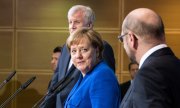New grand coalition, new Europe policy?
Germany's conservative CDU/CSU and the social democratic SPD have agreed on common ground for forming a new grand coalition. Whether the SPD's grass roots will agree remains uncertain. Europe's press is particularly interested in the opening section of the 28-page document, where the parties express support for the proposals of Emmanuel Macron and the EU Commission on the EU's reform and future development.
No guarantee that concessions will suffice
The grand coalition plans don't necessarily guarantee a fresh start in EU integration, Público comments:
“The agreement represents progress in the Eurozone's integration process because Germany is moving closer to France's standpoint. Moreover, it foresees an increase in the German contribution to the EU budget as well as non-specified solidarity and investment mechanisms, which is a very positive development. But as regards the EU the proposals don't go into much detail or name specific amounts. ... And as far as Germany's financial policy is concerned, the strategy seems to be to carry on as before. In short, the agreement contains very positive elements for Germany and the Eurozone but there's no guarantee that this will be enough.”
Eastern Europe should put on warm clothes
The outcome of the exploratory talks between the Union and the SPD will hit Eastern Europe hard, journalist Eliza Francu writes in Revista:
“As an explicit warning to Eastern Europe, which is opposing the refugee quotas, the paper states that the 'solidarity principle must be reflected in the EU budget'. In other words: the EU is no longer willing to give without the obligations being shared among its members. This is not just about responsibility for refugees but about the duty to respect the rule of law. ... Bad news for the 'demotatorships' in Eastern Europe. Up to now Poland and Hungary have relied on there being no efficient sanctions for countries that don't respect the European rules and values they committed to when they joined.”
From managerial to agenda-driven politics
For the first time a government led by Angela Merkel is proposing bold and sweeping reform plans for the EU, the Financial Times writes:
“The section on the future of the EU lays out the biggest push by Germany towards continental integration since the Maastricht treaty a quarter of a century ago. ...The section on Europe clearly reveals the hand of Martin Schulz, SPD leader and a former president of the European Parliament. ... Perhaps the most remarkable part about Friday's document is that it signals a shift from Ms Merkel's non-committal managerial style to more agenda-driven politics. We are approaching a new era.”
Egoistic and simple-minded
Deutschlandfunk is hugely disappointed:
“Not a word about the still considerable problems and repercussions of the euro crisis. Not a word about the enormous imbalance affecting the economic foundations of this EU. ... It already seems that [in the eyes of the potential coalition partners] there is only one country that counts for all plans regarding European policy. The partnership with France. This is to be the new driving force that will overcome all the problems. ... A new bilateral agreement with Paris is to form the basis for this. For what precisely though, one asks? Well that's something the potential coalition partners aren't keeping from us either. The basis for the driving force for digitisation and artificial intelligence! Wonderful! A new start for Europe couldn't be more narrow-minded, egotistic and unimaginative than this.”
Finland could lose its cover
Germany's future EU policy will also bring certain changes for Finland, Helsingin Sanomat believes:
“It's very surprising that the CDU-CSU agreed to the Social Democrats' demand that Germany assume a more active role and press ahead with the integration of the Eurozone together with French President Emmanuel Macron. Up to now Finland has always hidden behind Germany and pursued a passive EU policy. If on the basis of Friday's agreement a government is now formed in Germany that pursues a more active EU policy, Finland will lose that cover. Finland will then have to decide whether to play along.”
Italy in a poor position compared to Germany
For Italy the news from Germany is hard to swallow given its own weak position, Huffington Post Italia groans:
“The coalition consensus rests on two key pillars: the upper limit for migrants and tax cuts. The latter is possible thanks to a trade surplus of roughly 45 billion euros. Precisely these issues are also dominating the Italian election campaign - with one fundamental difference: the Italians are counting on receiving concrete aid from the EU regarding the distribution of refugees and a new deal with France making tax cuts possible at the expense of higher public debt. In this respect they are the exact opposite of the Germans, who are entirely their own bosses. They can spend as much as they have saved, also because they have been given free rein as regards what they do with the trade surplus.”
SPD's influence bad for Poland
The US is a more reliable partner for Poland than Germany, Gazeta Polska Codziennie concludes:
“The SPD's remaining in power is bad news for Poland. While it's unlikely that the party will be able to implement all the ideas of its leader Martin Schulz, with it a party that is clearly pro-Russian and critical vis-à-vis Poland will be part of the government. ... The AfD, which is going from strength to strength in the polls, is forcing the big parties to adopt an increasingly pro-Russian and anti-American course. All the more reason for Poland to cultivate its relationship with Washington, the guarantor of our safety. Paradoxically, Washington is a more predictable partner than Berlin.”

